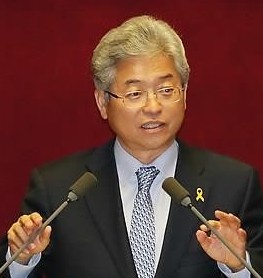- California Assembly OKs highest minimum wage in nation
- S. Korea unveils first graphic cigarette warnings
- US joins with South Korea, Japan in bid to deter North Korea
- LPGA golfer Chun In-gee finally back in action
- S. Korea won’t be top seed in final World Cup qualification round
- US men’s soccer misses 2nd straight Olympics
- US back on track in qualifying with 4-0 win over Guatemala
- High-intensity workout injuries spawn cottage industry
- CDC expands range of Zika mosquitoes into parts of Northeast
- Who knew? ‘The Walking Dead’ is helping families connect
’7 foreign workers joined IS after leaving Korea’

Rep. Lee Cheol-woo of the Saenuri Party, a member of the National Assembly Intelligence Committee. (Yonhap)
By Kang Seung-woo
Seven foreigners who have worked in Korea joined the Islamic State (IS) terrorist group, a ruling party lawmaker said Wednesday, citing information from the National Intelligence Service (NIS).
He did not disclose their nationalities.
They worked in Korea earlier this decade, and joined IS after leaving the country, according to Rep. Lee Cheol-woo of the Saenuri Party, a member of the National Assembly Intelligence Committee.
The lawmaker also said the government has deported 51 foreign nationals suspected of being affiliated with international terrorist groups since 2010.
The NIS revealed the information during a meeting with Saenuri lawmakers and foreign ministry officials at a session of the National Assembly to discuss the nation’s readiness against escalating global terrorist threats, Lee said.
“The agency believes that some 155,000 people from 57 Muslim countries are now living in the country,” he said. “Various circumstances show that Korea is vulnerable to terrorist attacks.”
In November, the NIS revealed that a total of 48 foreigners deemed security risks had been deported from Korea over the past five years, meaning that three more have been deported since then.
Amid growing Islamic terrorist activity that has expanded to Asia, concerns are rising that Korea may fall victim to an attack.
Last week, IS conducted a terrorist attack in Jakarta, Indonesia, against civilians and tourists ― the first attack in Asia by the radical Sunni Islamist militant group.
There were also warnings issued about threats in Singapore and the Philippines, spreading fears all over the region, even reaching Korea and Japan.
On Friday, the Korea Airports Corp. received a phone call from a person speaking in Arabic threatening to blow up all airports in the country.
Last year, IS vowed to attack the United States and other countries taking part in the so-called “crusader campaign” to fight the terrorist group, and Korea was included on the 62-nation target list, according to the foreign ministry.
In addition, an Indonesian man was apprehended in November on suspicion of showing support for the al-Nusra Front, a Syrian affiliate of al-Qaeda, on social media channels over a period of months.
Anti-terrorism bill
Following the meeting the government renewed its call for the National Assembly to swiftly pass anti-terrorism bills.
The bills are aimed at better protecting the nation from possible terrorist attacks, but have been gathering dust in the National Assembly for 15 years because the opposition party is concerned about giving more authority to the NIS.
“The anti-terrorism bills are designed to protect the lives of the people and should not be the subject of a bargaining tool,” said Kim Soo-min, a senior NIS official who participated in the government-ruling party meeting.
Also, Kim refuted the claim that the bills infringe upon citizens’ basic rights and that enhanced surveillance violates the right to privacy.
The Ministry of Foreign Affairs also stressed the need for the passage of the bills.
“Preemptively detecting and preventing threats should be made possible in order to effectively deal with terrorist attacks,” said Second Vice Foreign Minister Cho Tae-yul.
He said that the bills would allow the government to come up with more elaborate countermeasures.















